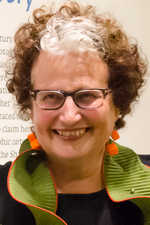Clark Art Institute Names Winner of Prize for Excellence in Arts Writing
 |
| Photo by Julie A. Wolf |
WILLIAMSTOWN, Mass. — Scholar and writer Darcy Grimaldo Grigsby has been selected to receive the Clark Art Institute's 2017 Clark Prize for Excellence in Arts Writing.
Grigsby is the Richard and Rhoda Goldman Distinguished Professor in the Arts and Humanities at the University of California, Berkeley. The award presentation will take place on Saturday, April 7, during an event at the Milton Resnick and Pat Passloff Foundation in New York City.
"The Clark Prize raises awareness of the importance of writing that bridges scholarly and popular interest in the arts and seeks to encourage support for such writing among publishers, editors and the public," said Olivier Meslay, the Felda and Dena Hardymon Director of the Clark. "Darcy Grimaldo Grigsby's writing is deeply rooted in serious academic tradition, but easily connects to the public through compelling prose and thoughtful analysis. We are delighted to recognize her work with the Clark Prize."
Grigsby, who was born in the Panama Canal Zone, focuses her scholarship on the history of art and material culture in France and the United States from the 18th to the early 20th century, especially in relation to colonialism, slavery, and constructions of race. She writes on painting, sculpture, photography, and engineering, as well as the relationships among reproductive media and new technologies.
"I am deeply honored to be awarded the Clark Prize for Excellence in Arts Writing," Grigsby said, "especially because my own priorities as a scholar and teacher so closely match its mission to honor 'accessible prose that advances public understanding' and 'appeal[s] to a diverse range of audiences.' What an admirable, generous, and profoundly political goal."
Michael Ann Holly, Starr Director Emeritus of the Clark's Research and Academic Program, led the 2017 jury for the Clark Prize. Other members of the panel included 2006 Clark Prize recipient Kobena Mercer, a scholar and critic, and David Breslin, the DeMartini Family Curator and Director of the Collection at the Whitney Museum of American Art.
"Darcy Grimaldo Grigsby has given us new, yet historically grounded, readings of canonical works of art and artists," Holly said. "As such, she is the first Clark Prize awardee in a few years who is an art historian rather than a scholar of modern and contemporary art. A versatile and graceful writer, she has published stunning essays on 19th-century figures ranging from the former slave Sojourner Truth to the influential French painter Theodore Gericault, among many others. Versed in interpretative modes of visual culture, such as postcolonial theory, psychoanalysis, and feminism, her writing is rich in historical detail with contemporary implications."
Grigsby is the author of three books: "Enduring Truths: Sojourner's Shadows and Substance" (University of Chicago Press, September 2015), "Colossal: Engineering the Suez Canal, Statue of Liberty, Eiffel Tower, and Panama Canal" (Periscope Publishing, 2012), and "Extremities: Painting Empire in Post-Revolutionary France" (Yale University Press, 2002). She is currently working on a fourth book, "Creole: Portraying France’s Foreign Relations in the Nineteenth Century," a collection of essays on the relationship between French art and the Caribbean and Americas (Penn State University Press).
In addition, Grigsby writes regularly for scholarly publications, including Art Bulletin, Art History, October, and Representations and is a frequent contributor to books and anthologies on topics related to her fields of study. Most recently, her essay "Blow-Up! Dynamite, Photographic Projection, and the Sculpting of American Mountains" appeared in Jennifer Roberts's edited volume "Scale" (Terra Foundation, 2016). She is an in-demand lecturer in the United States and abroad, and has made presentations at important academic conferences, including the College Art Association.
In 2016, Grigsby curated an exhibit at the Berkeley Art Museum titled "Sojourner Truth, Photography and the Fight Against Slavery" that was related to her book on the abolitionist leader and recognized Grigsby's gift to the museum of her personal collection of American Civil War cartes-de-visites, small photographic calling cards.
She is the recipient of numerous fellowships and awards, including two Andrew W. Mellon New Directions Fellowships; a grant from the Graham Foundation for Advanced Studies in the Fine Arts; a J. Paul Getty Postdoctoral Fellowship; an Andre Chastel Bourse, INHA (Institut national d'histoire de l'art) fellowship at the Villa Medici, Rome; a residential Senior Fellowship at the Terra Foundation for American Art, Giverny, France; and the Distinguished Teaching Award from the University of California, Berkeley.
A Fulbright scholar, Grigsby holds a bachelor of arts degree from the University of California, Berkeley, and master of arts and doctoral degrees from the University of Michigan.
The Clark Prize is funded by the Beinecke Family through the Prospect Hill Foundation. It is accompanied by a $25,000 honorarium and an award designed by Pritzker Prize-winning architect Tadao Ando, the designer of two buildings on the Clark's Williamstown campus.
Tags: Clark Art,















